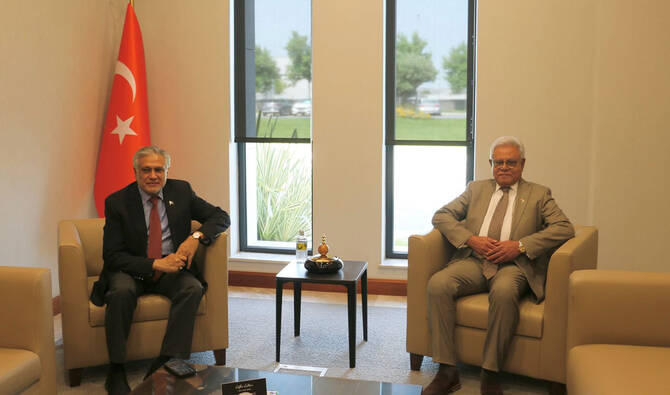ISLAMABAD: Pakistan’s Deputy Prime Minister and Foreign Minister Ishaq Dar arrived in Istanbul on Friday to attend the 51st session of the Organization of Islamic Cooperation (OIC) Council of Foreign Ministers, his office said, as Israel and Iran continue to engage in military conflict while the humanitarian situation in Gaza deteriorates.
The 51st session of the OIC Council of Foreign Ministers is expected to focus on coordinated efforts to de-escalate tensions between Iran and Israel, the two regional rivals, along with the ongoing humanitarian crisis in Gaza.
The meeting comes at a time when Middle East tensions are high, with Iran and Israel trading missiles and strikes for seven days now. Pakistan has condemned Israel for launching a surprise attack on Iran’s nuclear facilities and military leadership last Friday, calling for peace and diplomacy to resolve the issue.
“Deputy Prime Minister/Foreign Minister, Senator Mohammad Ishaq Dar @MIshaqDar50, arrived in Istanbul to participate in the 51st Session of the Council of the Foreign Minister (CFM) of the Organization of Islamic Cooperation (OIC) being held on 21-22 June 2025 and to attend the Islamic Cooperation Youth Forum award ceremony where President Erdogan will be honored,” the Foreign Office said in a press release.
The Pakistani foreign office said Dar was received by Pakistan’s Ambassador to Turkiye, Dr. Yousaf Junaid, Consul General Nauman Aslam and the representatives of the Turkish ministry of foreign affairs.
“During the plenary session, the DPM/FM will share Pakistan’s perspective on the developments in South Asia following the ceasefire arrangement between Pakistan and India and the situation in the Middle East after Israel’s recent aggression against Iran and other regional states,” the foreign office spokesperson, Shafqat Ali Khan, said in a statement on Thursday.
He added that Dar would advocate for peace in the Middle East and highlight the need for humanitarian assistance to the people of Gaza during the meeting on June 21 and 22.
Beyond the Middle East, Dar is also expected to address broader issues of concern to the Muslim world, urging the international community to “combat the escalating tide of Islamophobia” by addressing rising extremism and militancy, as well as the growing threat of climate change.
He will also reaffirm Pakistan’s commitment to the principles and objectives of the OIC in addressing challenges faced by Muslim nations globally.
Dar, who also holds the portfolio of foreign minister, is scheduled to hold bilateral meetings with his counterparts from other OIC member states on the sidelines of the conference.
The high-level meeting is taking place amid media reports that the United States is weighing options, including potentially joining Israeli strikes on Iranian nuclear sites.












